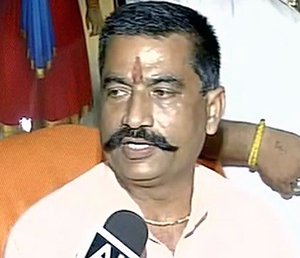Patiala, Aug 8: Punjab police has booked Gau Raksha Dal Chief Satish Kumar for allegedly assaulting some persons on pretext of cow protection, a day after Prime Minister Narendra Modi asked the states to act against "fake" cow protectors.
The FIR was lodged on the basis of a video clip which appeared on social media, showing Gau Raksha Dal members brutally thrashing people, SSP Gurmeet Chauhan today said.
A case under sections 382 (having made preparation for causing death), 384 (committing extortion), 341 (wrongfully restraining any person), along with sections 148 and 149, of the
Indian Penal Code (IPC) was registered, police said.
Kumar, who is yet to be arrested, said he has no information regarding the case. He alleged that the Prime Minister's remarks against cow vigilantism were motivated by
"votebank politics" due to upcoming elections in many states.
"The PM's statement is politically motivated. It is one-sided. If he had warned the butchers not to slaughter or smuggle cow, then his statement would have been justified.
"He is doing vote bank politics to get the butchers' vote," Kumar said. He said the police were free to arrest him.
The Prime Minister's statement denunciating cow vigilantism came after a string of incidents of attacks on Dalits, including in Una, Gujarat where some youths were brutally assaulted for skinning a dead cow.





Comments
He looks like Born Dacoit, he should be behind bars
Add new comment